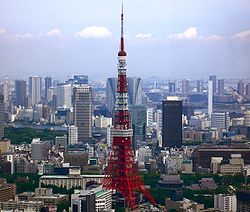
Back العقود المفقودة Arabic Изгубеното десетилетие Bulgarian Dècada perduda Catalan Ztracená dekáda (Japonsko) Czech Década perdida (Japón) Spanish دهه از دست رفته (ژاپن) Persian Décennie perdue (Japon) French העשור האבוד (יפן) HE Dasawarsa yang Hilang (Jepang) ID Decennio perduto (Giappone) Italian
| Part of a series on the |
| History of Japan |
|---|
 |
The Lost Decades is a lengthy period of economic stagnation in Japan precipitated by the asset price bubble's collapse beginning in 1990. The singular term Lost Decade (失われた10年, Ushinawareta Jūnen) originally referred to the 1990s,[1] but the 2000s (Lost 20 Years, 失われた20年)[2] and the 2010s (Lost 30 Years, 失われた30年)[3][4][5] have been included by commentators as the phenomenon continued.[4]
From 1991 to 2003, the Japanese economy, as measured by GDP, grew only 1.14% annually, while the average real growth rate between 2000 and 2010 was about 1%, both well below other industrialized nations.[6][4] Debt levels continued to rise in response to the financial crisis in the Great Recession in 2008, the Tōhoku earthquake and tsunami and the Fukushima nuclear disaster in 2011, and the COVID-19 pandemic and subsequent recession between January 2020 and October 2021. Broadly impacting the entire Japanese economy, over the period of 1995 to 2023, the country's GDP fell from $5.33 trillion to $4.21 trillion in nominal terms,[7] real wages fell around 11%,[8] while the country experienced a stagnant or decreasing price level.[9]

Under deflation, the value of cash increases as time passes. In such a situation, Japanese companies began to cut wages, research and development, and other investments, opting to hold onto cash instead. This tendency, coinciding with the acceleration of the ageing population, gradually diminished the competitiveness of the economy and the potential growth rate of the country.[10] The Bank of Japan (BoJ) and the Japanese government has focused on halting the deflation and eventually acheiving the 2% inflation target since the early 2000s. However, as deflation persisted, the traditional monetary policy of setting low interest rates to stimulate investment and consumption, which typically causes inflation, became ineffective. This ineffectiveness arose because a nominal rate of 0% effectively meant a positive real rate due to the increasing value of cash. This phenomenon is known as the "Zero Interest Rate Constraint".[11]
In 2013, BoJ implemented the Quantitative and Qualitative Monetary Easing Policy, and in 2016, it introduced a negative bank rate of -0.1%.[12] This policy achieved mild inflation of around 0-1.0% in the late 2010s.[13] The global inflation surge from 2021 to 2023 finally helped Japan reach an inflation rate of above 2%. However, while other major economies focuses on suppressing inflation by raising interest rates, Japan aims to firmly establish inflation by maintaining low rates. As a side effect, the Japanese yen has become extremely weak, hitting a 34-year low of 160 yen/USD in May 2024.[14] The real effective exchange rate was at 69.99 in April 2024, the lowest level since statistics began in 1970, with the 2020 average set at 100.[15][16][17] This devaluation of the currency caused Japan to lose its status as the world’s third largest economy to Germany in nominal terms, which was approximately half the size of the country's economy a decade earlier.[18][19][20]
While there is some debate on the extent and measurement of Japan's setbacks,[21][22] the economic effect of the Lost Decades is well established, and Japanese policymakers continue to grapple with its consequences.
- ^ "Hayashi Prescott" (PDF).
- ^ Leika Kihara (August 17, 2012). "Japan eyes end to decades long deflation". Reuters. Retrieved September 7, 2012.
- ^ "円は一段と上昇か、日本は次の失われた10年に直面-ムーディーズ". Bloomberg.com (in Japanese). 17 June 2016. Retrieved 2020-10-18.
- ^ a b c "「失われた30年」に向かう日本". Newsweek日本版 (in Japanese). 2010-12-23. Retrieved 2020-10-18.
- ^ "「失われた30年」となる可能性も 次の10年を考えて投資しよう". MONEYzine (in Japanese). Retrieved 2020-10-18.
- ^ Nielsen, Barry. "The Lost Decade: Lessons From Japan's Real Estate Crisis". Investopedia. Retrieved 2020-05-26.
- ^ "Japanese GDP, nominal".
- ^ "Waging a New War". March 9, 2013.
- ^ "Inflation Japan - CPI inflation".
- ^ How we make monetary policies. (In Japanese) 6 June 2022, Haruhiko Kuroda (Governor of the Bank of Japan)
- ^ "Monetary Policy Under the Zero Interest Rate Constraint and Balance Sheet Adjustment : 日本銀行 Bank of Japan". Bank of Japan. Retrieved 2024-06-02.
- ^ "(Reference) Monetary Policy under Quantitative and Qualitative Monetary Easing Introduced in 2013 : 日本銀行 Bank of Japan". Bank of Japan. Retrieved 2024-06-02.
- ^ "Statistics Bureau Home Page/Consumer Price Index Japan 2023". www.stat.go.jp. Retrieved 2024-06-02.
- ^ "The Yen Appreciates Greatly, Rising From 160 Yen/USD to 154 Yen/USD". The Nikkei (in Japanese). 2024-04-30. Retrieved 2024-06-02.
- ^ "時系列データ表示:グラフ". www.stat-search.boj.or.jp. Retrieved 2024-06-03.
- ^ "円の実力、なぜ過去最低水準 金利差だけではない日本経済の「弱さ」:朝日新聞デジタル". 朝日新聞デジタル (in Japanese). 2023-12-22. Retrieved 2024-06-03.
- ^ "このままでは日本の伝統的企業が海外に買われていく…円安が止まらない日本を待ち受ける"最悪のシナリオ" 政府は円安政策を意図的に進めているように見える". PRESIDENT Online(プレジデントオンライン) (in Japanese). 2024-05-09. Retrieved 2024-06-03.
- ^ Montgomery, Hanako; He, Laura (15 February 2024). "Japan slips into recession, allowing Germany to overtake as world's third-largest economy". CNN.
- ^ McCurry, Justin (15 February 2024). "Japan loses crown as world's third-largest economy after it slips into recession". The Guardian.
- ^ "GDP - Gross Domestic Product 2012 | countryeconomy.com". countryeconomy.com. Retrieved 2024-06-02.
- ^ Fingleton, Eamonn (January 6, 2012). "The Myth of Japan's Failure". The New York Times.
- ^ Fingleton, Eamonn (January 12, 2012). "Video interview on BBC News with Eamonn Fingleton". BBC News, 5 min. 26 sec.
© MMXXIII Rich X Search. We shall prevail. All rights reserved. Rich X Search